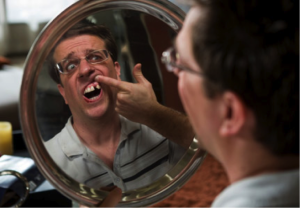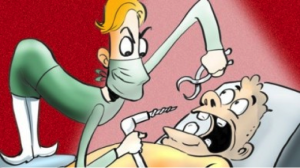
Does the portrayal of dentists and dentistry in the media represent reality?
by Gideon, exclusively for DentalBuzz
Meeting new or existing patients with dental fear or phobia is growing more commonplace in a society that is led by the media. The portrayal of dentistry in the media is not always a positive, pain-free one and much like other medical practices, this has led to a generation of people who simply are not visiting their dentist. So is the regularly frightening or comedic portrayal of the industry a real representation of dental practices?
The media is not singularly at fault for dental phobias and this article is not setting out to prove otherwise. As we are all aware, early childhood experiences, other medical treatments that may have been unpleasant and learning fears from others all play their separate parts. From cosmetic dentists through to dental surgeons, none are immune from nervous and frightened patients – we are in fact trained to deal with patients’ worries in a compassionate and supportive manner.
Representation in the movies
Many of us will remember the dentist from Little Shop of Horrors first; Steve Martin did an excellent job as arguably the most terrifying and hilarious dentist in film history. With the use of oversized, out of date and unconventional equipment, it is clear to see how the notion of a narcissistic dentist fell into the public eye and into our hearts. It is quite obvious that dentists don’t use such techniques in practice but suggestion can be as damaging to reputations as reality. However, this film was far less damaging than the 1976 adaptation of Goldman’s The Marathon Man. The depiction of the Nazi dentist, who not only caused his patients extreme pain but also experimented inside their mouths, can be argued as the cause of the 70-80’s generation avoiding the dentist.
Throughout many movies and equally TV shows, dentists are often portrayed as either narcissists or as incompetent fools. There are very few noteworthy characters where this is not the case, at least in the US and the UK. In the early 2000’s the British TV show, ‘My Family’ had the leader of the home as a dentist who didn’t care for his family and cared even less about his patients. This is not the first role like this and it won’t be the last.
Even those movies where dentistry or even indirect dental references are used in a comedic way, such as The Hangover or Horrible Bosses, just the mention of this form of work is enough to remind a patient of a previous bad experience they may have had. It is this form of visual trigger that has caused a severe decline in dental health over the past few years. There is however a flip side to this notion. Dr Stu Price from the Hangover films does a fantastic job of portraying the dental health service in a positive, funny and upbeat manner. This may serve to lessen patient’s fears rather than increase them.
Cartoons
We all know that the age we need to start the education program about personal health is when patients are very young. It is why we hand out badges or stickers to our younger guests, but this work is then counteracted by the portrayal of dentists within children’s cartoons. Whatever age you are, it can be assumed that at some point you will have watched a cartoon where a dentist created all manner of horrific contraptions. Psychologically, although these contraptions and potions may be viewed as funny by your child, they can leave negative mental scars that are far harder to eradicate in later life.

It is at this tender age that dentistry, along with other medical procedures and practices need to be portrayed in a positive fashion. To eradicate dental phobia, the representation of the profession to younger people must become more educational and realistic.
![]()
Gideon is a 3rd year student at Brandeis University well on his way to becoming a dentist, and who appreciates films, family, TV, the dentists who are currently mentoring him and all the people in the world who may one day be his patients.